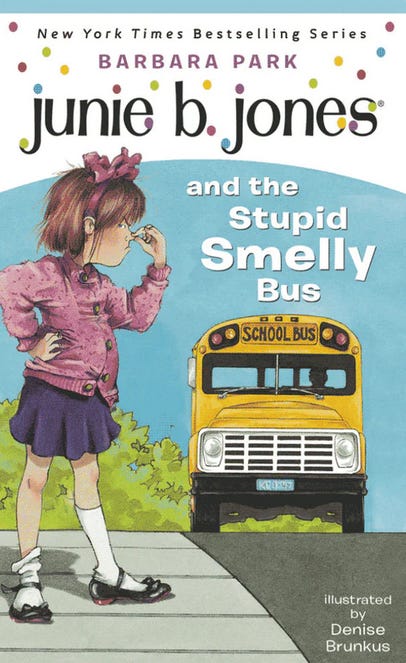Junie B. Jones
Prepare for bossiness
Hello Snarfs!
Hope you enjoyed the holidays. I’m finally back into enough of my normal rhythm to be writing these. If you know anyone looking for some second semester reading material, please forward this along, and if you’re new here, check out the archives before you go.
Now onto…
The Series: Junie B. Jones
The Author: Barbara Park
The Illustrator: Denise Brunkus
Length/Picture Density: 75-95, frequent pictures
Writing from a kid’s perspective — their actual perspective — is really hard. Writing through the eyes of a likable main character without a particularly distinct narrative voice is one thing, but it’s very much another to occupy the voice of a kid as they get frustrated with their parents, act out, try to understand the world, imagine, and all the intense stuff that kids do and experience all the time.
This preamble might be making these books sound more emotionally challenging than they are. Junie B. Jones is not a series of heartfelt tearjerkers, mainly because Junie is self-assured and hilarious. She’s a kid with a lot of confidence and opinions, but she also has to deal with the major challenges of kid life: riding the bus, behaving, having friends and classmates, going to events, trying weird foods, and all the other stuff we coax our kids through with a mix of trying to make things work out as well as possible while also presenting it as the reality that they are going to have to deal with one way or another.
What these books achieve is making her a character we can laugh at and love at the same time. She’s not an easy kid, and we can see the adults in her life trying to figure out how best to handle her.
Basically, these books are Dory Fantasmagory, but instead of Dory’s intense imaginary world, we have more ordinary social situations and a very bossy protagonist. The Dory books get a ton of mileage from the illustrations (the author/illustrator Abby Hanlon is a master of facial expressions), while the Junie books make fun stepping stones out of her neologisms and turns of phrase.
I find the Junie books a little cringier — the big moments that Dory could find embarrassing or shameful are so absurd, and she never does feel that way because she’s so wrapped up in her imagination. Junie gets to be the hero of her own internal story, but in a way that often involves confronting her behavior in a somewhat more realistic way.
I’m not sure if I can tease out a real moral or message from these books, but sometimes the story and the voice and the character is the message. The message is that this is kind of what it’s like to be a kid. Their worlds are probably more unique and personal than ours, and one of the big, unwieldy tasks we have as parents is to let them live and explore in their world while also coming to understand and operate in a more collective existence.
Both Dory and Junie’s main conflict is against reality and parental and school expectations, but only Junie is really made to settle things in the collective reality.
That’s what these books make me think about, but only kind of communicates what it’s like reading them. So here’s what they’re like: The Junie B. Jones books are delightful and hilarious, short and digestible, with a protagonist that kids can both root for and feel wiser than. They’re easy enough to do in one sitting. Good for four or five and up, and I imagine plenty to enjoy for older ages.
The awkward situations she gets herself into might eventually drag on you or your kid, but don’t let that scare you away. These are well worth a look.
Oh, and if you like them, there are 30+, so you won’t run out anytime soon.

